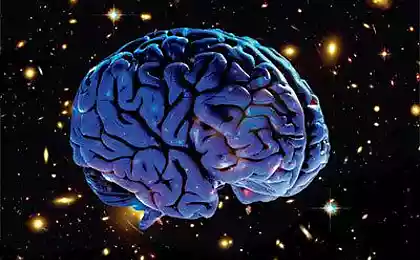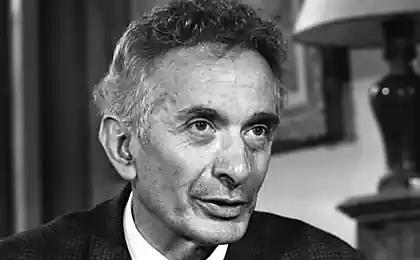1429
9 interesting thought experiments
Try to understand these interesting conclusions
Philosophy is not a science, philosophy - a way of life. Arguments about the imaginary bugs in boxes, not born pigs and life spider urinal can cause serious concerns for the mental health of participants in these discussions, but not in a hurry to twist a finger at his temple - better try to think what is behind this or that, it would seem far-fetched problem .
With the help of these mental exercises a person can solve the most complex questions of life and consciousness (you, by the way, already know that for you first?), And even find peace of mind. Of course, while another philosopher throw another paradoxical task. We offer you 9 thought experiments that may not change your life, but, at least, make think hard.
1. The dilemma of the prisoner

The classical problem of the theory of games, in which the subject must decide to confess to a crime or not, despite the fact that he does not know how to answer his accomplice.
Here's how to formulate a prisoner's dilemma "Stanford Encyclopedia of Philosophy»:
"Two arrested for bank robbery and placed in different cells. The investigator asked each deal: "If you confess and your accomplice will be silent, I'll take all the charges against you, and he will receive a great time. If co-defendant will testify, and you will be silent, let him go and put you at exactly the same time. If you recognize the two, you get the time, but I have it arranged for you two parole. If neither of you is not recognized, it is necessary to put both of them, but not for long, because direct evidence against you is no "».
Assuming that both of the accused only care about the minimum time for yourself, everyone there is a difficult dilemma in which the option of betrayal dominates cooperation with an accomplice because of the fact that one does not know how the other will behave. The best way out for both is silent, however, arguing rationally, almost everyone comes to that deliver more profitable than to cooperate, no matter how will behave accomplice. Rationality everyone together leads them to irrational decisions.
2. Room Mary
This thought experiment is directed against the philosophy of physicalism as the belief that everything in the world, including the mental processes of a physical nature. From the experiment, it follows that there are non-physical properties of the world that you can perceive only through direct experience.

Frank Jackson
One of the creators of the concept, Frank Jackson, stated the problem well:
"Mary, a brilliant scientist, forced to explore the world of black and white room via a black and white monitor. She specializes in the neurophysiology of vision, and assume it has the greatest possible physical information that can be obtained about what we feel when we see ripe tomatoes, or the sky, or when we use the word "red", "blue", and so on. For example, it knows which combination of wavelengths emitted air stimulate the retina, and what exactly is happening in the central nervous system when pronounce terms "blue sky". What will happen when Mary will come out of his room, or when it will color monitor? Will she know anything new? »
In other words, Mary knows everything about the color, but the most important thing: she had never seen any colors other than shades of black and white, so can not tell the difference between academic knowledge and actual experience.
This problem makes it clear that even objective observation does not allow a person to get an idea of all the properties of the object. Simply put, we can not imagine what it is we do not know.
3. Beetle in a box
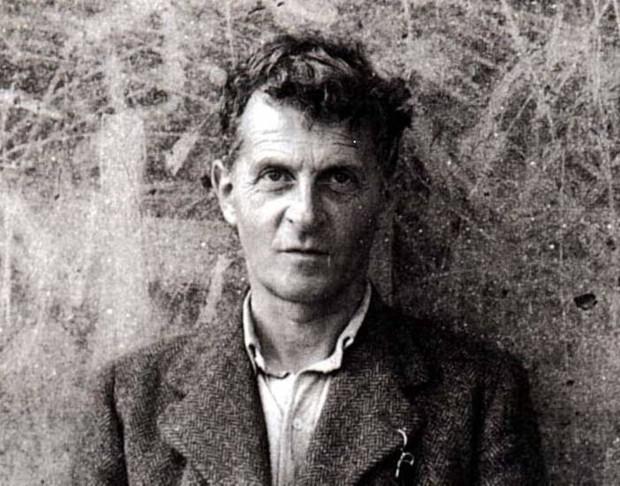
Ludwig Wittgenstein
The experiment proposed by Ludwig Wittgenstein, shows that people in principle can not understand each other until the end.
Imagine that a group of people, and each of them has a box that contains something that everyone calls the beetle. No one can look into someone else's box, but everyone says that it is on the mind of his beetle knows what it's really a bug, and no one knows what is in the boxes at the other owners' beetles ».
In the discussion the members of the group that is in their boxes, the term "bug" no longer makes sense, because everyone means something different, but what exactly - no one knows. Thus, the "bug" begins to signify simply "what is in the box».
Wittgenstein believed that the experiment perfectly illustrates the fact that a person never knows for sure that his interlocutor is referring to, because they do not know what he thinks. Experiment Wittgenstein linked to so-called hard problem of consciousness, described by the Australian philosopher David Chalmers and the phenomenon of qualia, that is, the dependence of perception of the world from the mental state.
4. Chinese Room

Imagine a person who knows only one language, such as Russian. He sits in a room and using the detailed tutorial that allows you to intelligently handle Chinese characters, even without understanding their meaning, is a variety of proposals in Chinese.
If this for him, for example, through a window, watching people speaking in Chinese, they will develop a full impression that the people in the room and also knows the language.
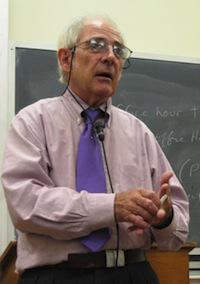
John Searle
The experiment is considered its author, the American philosopher John Searle - is a strong argument against the possibility of creating artificial intelligence. Even if your computer is able to recognize it and formulate proposals, in fact he does not understand their meaning, because it operates on the program, embedded in a person, as a person in a room acts on the instructions and is the right phrase in Chinese, but in fact I do not know the language.
Some researchers have put forward arguments against the concept Sёrlya, arguing that it is necessary to consider the room, a book with instructions and the person in the system, and this suggests that the interaction between the three components allows the system to truly understand Chinese. Others believe that the human mind - the manipulation of concepts, which are incorporated in the brain training as well as the program can be loaded into the car, so anything is possible in the creation of computer intelligence is not.
5. The machine for the production of personal experience
The American philosopher Robert Nozick has developed a thought experiment, hinting that people might actually be able to live in the Matrix.
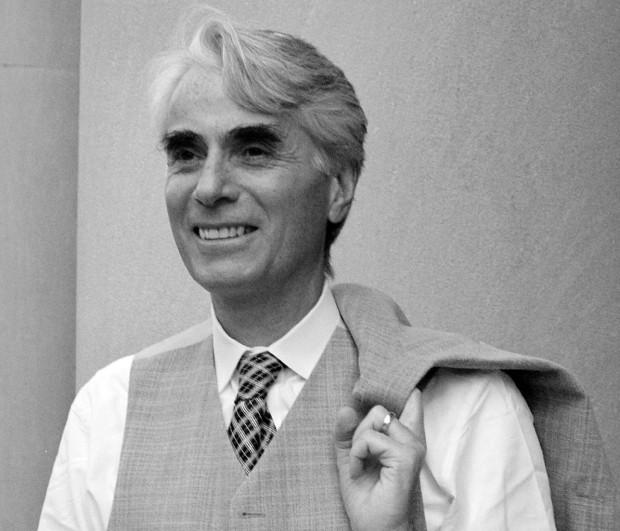
Robert Nozick
Suppose that the scientists have created a machine that allows a person to give any experience, which he likes. By stimulating the brain, it can generate feelings, for example, by reading an interesting book, dating with someone or writing a novel. Would you agree to connect to a car, pre-programmed everything that you should "happen", it being understood that all life will spend with electrodes connected to the brain, but the experience will not be different from the real life experience?
The basic idea of the experiment Nozick is that a person can actually be a good reason to connect to a "machine for the production of personal experience" (as it calls itself a philosopher). In life, people are often deprived of the opportunity of choice, even in favor of the "artificial" experiences, so the temptation is great. Of course, we can say that no "virtual reality" is no substitute for this, but one way or another, Nozick raised the problem for several decades is the cause of numerous philosophical disputes.
6. The trolley problem

Now there are many versions of this thought experiment, but its principles were formulated by the English philosopher Philippa Foot back in 1967 in the article "Abortion and the doctrine of double effect." The essence of the following:
"According to the rails with great speed rushing severe uncontrolled trolley. On the way her tied to the rails following the five people who would inevitably die. You have the ability to translate the arrow, and the trolley will roll on siding, but it will crush the other person is also tied to the rails. What would you do? »
Utilitarians who believe that the moral value of an act is determined by its usefulness, of course, translate arrow to minimize negative consequences. Proponents of Kantian philosophy (named after its creator - Immanuel Kant), certainly will not interfere, because they regard humans as a goal, not as a means, therefore, even one person can not be a tool for saving five others.
In another embodiment of this dilemma role arrows plays fat, you want to knock on the rails to prevent the trolley to kill others, but this does not affect the difficulty of choosing between the conscious murder of one, even in order to save a few people, and non-interference, followed by the death of five .
7. Spider in the urinal

The idea of this experiment, the unexpected, which has already become a classic, came to the American philosopher Thomas Nagel, when he went to the toilet at Princeton University in the urinal and noticed a small spider, seemed very sad. Every time a philosopher peeing in a urinal, the spider became even sadder if in despair. Nagel raised the issue with the spider in his essay "The birth, death and the meaning of life»:

Thomas Nagel
"I went to the bathroom, looked at the spider in the urinal and gradually his pathetic began to oppress me. Of course, it is possible for him it was the natural habitat, but only because he was trapped smooth porcelain wall and could not get out, there was no way of knowing whether he wants to leave the urinal or not.
One day I decided - took a big chunk of toilet paper and dropped it into the urinal, the spider grabbed it, I pulled it out and put him on the floor. He sat motionless, and I left. When I returned a couple of hours, the spider was there, and when the next day I went to the bathroom, I found this place on his body ».
This experiment demonstrates that, even acting with the best intentions, people do not know what actually can cause interference in his situation, and that is a boon to the specific situation of each participant.
8. Quality or quantity?
Imagine a world in which all become vegetarians. People would no longer raise animals destined for slaughter, which means that millions of pigs, cows and chickens would not have had even the right to life, albeit with subsequent conversion into patties or getting into the soup.
Not only domesticated animal totally unprepared for independent living, so one way or another, most of these animals doomed even without a butcher knife - chickens have forgotten how to fly, which makes them easy prey for predators, and cows have suffocated in the first winter. Those who did manage to adapt to natural conditions would have caused irreparable harm to the wild. Do you think it's better than eating meat?
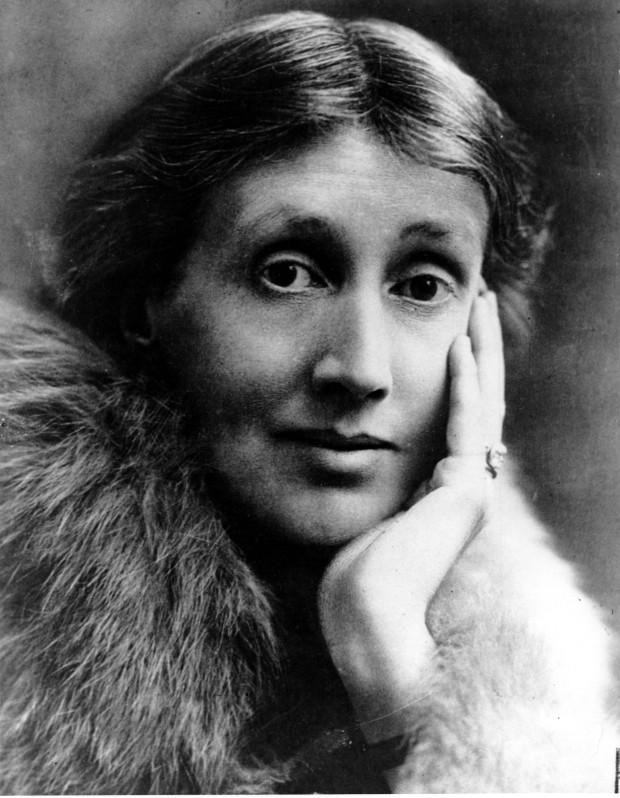
Virginia Woolf
The famous British writer Virginia Woolf once said:
"Of all the arguments in favor of vegetarianism, those who give voice to the people - the weakest. Pig most interested in the demand for bacon. If all were Jews, the pigs in the world would have almost no ».
Of course, the statement is very controversial: it is better, for example, when 20 billion people live in poverty, or when 10 billion bathe in luxury? If the latter, then what about 10 billion individuals who will never appear on the light? On the other hand, how do you can worry about those who will never be? Every man for himself decides for himself.
9. Start from scratch
An interesting thought experiment in the field of the political philosophy of John Rawls suggested that an American.
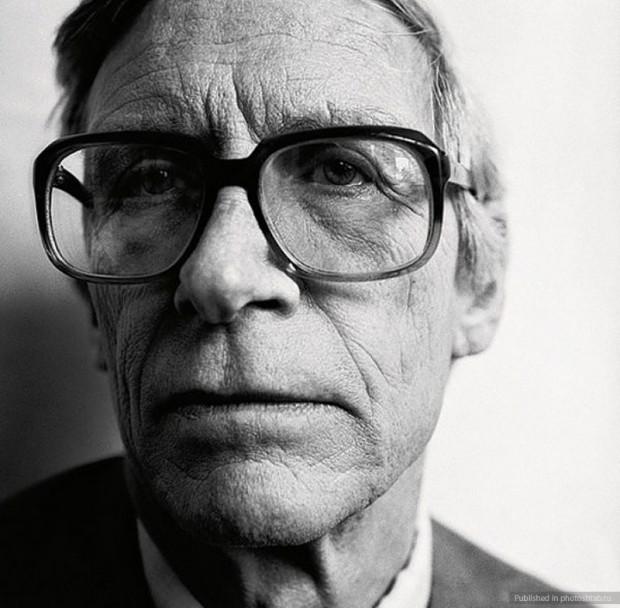
John Rawls
Imagine that you are with a group of other people are in a situation where you together need to develop principles of human society in which to live, but none of you have no idea about philosophical concepts, models of government, the laws of physics, the achievements of psychology, economics, biology and other sciences. Because some "veil of ignorance" no one can appreciate their natural and social situation, in general, have to re-create the laws of human existence.
Question: do you agree to that if you do not follow selfish and self-interest?
Rather, according to Rawls, gradually have been established guidelines to ensure everyone equal rights and fundamental freedoms, for example, providing opportunities for education and employment, but his theory of justice, which implies the presence of a single natural justice for every human being as such, and not for individuals or classes, is criticized by many philosophers as utopian.
Source Your text to link ...
Philosophy is not a science, philosophy - a way of life. Arguments about the imaginary bugs in boxes, not born pigs and life spider urinal can cause serious concerns for the mental health of participants in these discussions, but not in a hurry to twist a finger at his temple - better try to think what is behind this or that, it would seem far-fetched problem .
With the help of these mental exercises a person can solve the most complex questions of life and consciousness (you, by the way, already know that for you first?), And even find peace of mind. Of course, while another philosopher throw another paradoxical task. We offer you 9 thought experiments that may not change your life, but, at least, make think hard.
1. The dilemma of the prisoner

The classical problem of the theory of games, in which the subject must decide to confess to a crime or not, despite the fact that he does not know how to answer his accomplice.
Here's how to formulate a prisoner's dilemma "Stanford Encyclopedia of Philosophy»:
"Two arrested for bank robbery and placed in different cells. The investigator asked each deal: "If you confess and your accomplice will be silent, I'll take all the charges against you, and he will receive a great time. If co-defendant will testify, and you will be silent, let him go and put you at exactly the same time. If you recognize the two, you get the time, but I have it arranged for you two parole. If neither of you is not recognized, it is necessary to put both of them, but not for long, because direct evidence against you is no "».
Assuming that both of the accused only care about the minimum time for yourself, everyone there is a difficult dilemma in which the option of betrayal dominates cooperation with an accomplice because of the fact that one does not know how the other will behave. The best way out for both is silent, however, arguing rationally, almost everyone comes to that deliver more profitable than to cooperate, no matter how will behave accomplice. Rationality everyone together leads them to irrational decisions.
2. Room Mary
This thought experiment is directed against the philosophy of physicalism as the belief that everything in the world, including the mental processes of a physical nature. From the experiment, it follows that there are non-physical properties of the world that you can perceive only through direct experience.

Frank Jackson
One of the creators of the concept, Frank Jackson, stated the problem well:
"Mary, a brilliant scientist, forced to explore the world of black and white room via a black and white monitor. She specializes in the neurophysiology of vision, and assume it has the greatest possible physical information that can be obtained about what we feel when we see ripe tomatoes, or the sky, or when we use the word "red", "blue", and so on. For example, it knows which combination of wavelengths emitted air stimulate the retina, and what exactly is happening in the central nervous system when pronounce terms "blue sky". What will happen when Mary will come out of his room, or when it will color monitor? Will she know anything new? »
In other words, Mary knows everything about the color, but the most important thing: she had never seen any colors other than shades of black and white, so can not tell the difference between academic knowledge and actual experience.
This problem makes it clear that even objective observation does not allow a person to get an idea of all the properties of the object. Simply put, we can not imagine what it is we do not know.
3. Beetle in a box

Ludwig Wittgenstein
The experiment proposed by Ludwig Wittgenstein, shows that people in principle can not understand each other until the end.
Imagine that a group of people, and each of them has a box that contains something that everyone calls the beetle. No one can look into someone else's box, but everyone says that it is on the mind of his beetle knows what it's really a bug, and no one knows what is in the boxes at the other owners' beetles ».
In the discussion the members of the group that is in their boxes, the term "bug" no longer makes sense, because everyone means something different, but what exactly - no one knows. Thus, the "bug" begins to signify simply "what is in the box».
Wittgenstein believed that the experiment perfectly illustrates the fact that a person never knows for sure that his interlocutor is referring to, because they do not know what he thinks. Experiment Wittgenstein linked to so-called hard problem of consciousness, described by the Australian philosopher David Chalmers and the phenomenon of qualia, that is, the dependence of perception of the world from the mental state.
4. Chinese Room

Imagine a person who knows only one language, such as Russian. He sits in a room and using the detailed tutorial that allows you to intelligently handle Chinese characters, even without understanding their meaning, is a variety of proposals in Chinese.
If this for him, for example, through a window, watching people speaking in Chinese, they will develop a full impression that the people in the room and also knows the language.

John Searle
The experiment is considered its author, the American philosopher John Searle - is a strong argument against the possibility of creating artificial intelligence. Even if your computer is able to recognize it and formulate proposals, in fact he does not understand their meaning, because it operates on the program, embedded in a person, as a person in a room acts on the instructions and is the right phrase in Chinese, but in fact I do not know the language.
Some researchers have put forward arguments against the concept Sёrlya, arguing that it is necessary to consider the room, a book with instructions and the person in the system, and this suggests that the interaction between the three components allows the system to truly understand Chinese. Others believe that the human mind - the manipulation of concepts, which are incorporated in the brain training as well as the program can be loaded into the car, so anything is possible in the creation of computer intelligence is not.
5. The machine for the production of personal experience
The American philosopher Robert Nozick has developed a thought experiment, hinting that people might actually be able to live in the Matrix.

Robert Nozick
Suppose that the scientists have created a machine that allows a person to give any experience, which he likes. By stimulating the brain, it can generate feelings, for example, by reading an interesting book, dating with someone or writing a novel. Would you agree to connect to a car, pre-programmed everything that you should "happen", it being understood that all life will spend with electrodes connected to the brain, but the experience will not be different from the real life experience?
The basic idea of the experiment Nozick is that a person can actually be a good reason to connect to a "machine for the production of personal experience" (as it calls itself a philosopher). In life, people are often deprived of the opportunity of choice, even in favor of the "artificial" experiences, so the temptation is great. Of course, we can say that no "virtual reality" is no substitute for this, but one way or another, Nozick raised the problem for several decades is the cause of numerous philosophical disputes.
6. The trolley problem

Now there are many versions of this thought experiment, but its principles were formulated by the English philosopher Philippa Foot back in 1967 in the article "Abortion and the doctrine of double effect." The essence of the following:
"According to the rails with great speed rushing severe uncontrolled trolley. On the way her tied to the rails following the five people who would inevitably die. You have the ability to translate the arrow, and the trolley will roll on siding, but it will crush the other person is also tied to the rails. What would you do? »
Utilitarians who believe that the moral value of an act is determined by its usefulness, of course, translate arrow to minimize negative consequences. Proponents of Kantian philosophy (named after its creator - Immanuel Kant), certainly will not interfere, because they regard humans as a goal, not as a means, therefore, even one person can not be a tool for saving five others.
In another embodiment of this dilemma role arrows plays fat, you want to knock on the rails to prevent the trolley to kill others, but this does not affect the difficulty of choosing between the conscious murder of one, even in order to save a few people, and non-interference, followed by the death of five .
7. Spider in the urinal

The idea of this experiment, the unexpected, which has already become a classic, came to the American philosopher Thomas Nagel, when he went to the toilet at Princeton University in the urinal and noticed a small spider, seemed very sad. Every time a philosopher peeing in a urinal, the spider became even sadder if in despair. Nagel raised the issue with the spider in his essay "The birth, death and the meaning of life»:

Thomas Nagel
"I went to the bathroom, looked at the spider in the urinal and gradually his pathetic began to oppress me. Of course, it is possible for him it was the natural habitat, but only because he was trapped smooth porcelain wall and could not get out, there was no way of knowing whether he wants to leave the urinal or not.
One day I decided - took a big chunk of toilet paper and dropped it into the urinal, the spider grabbed it, I pulled it out and put him on the floor. He sat motionless, and I left. When I returned a couple of hours, the spider was there, and when the next day I went to the bathroom, I found this place on his body ».
This experiment demonstrates that, even acting with the best intentions, people do not know what actually can cause interference in his situation, and that is a boon to the specific situation of each participant.
8. Quality or quantity?
Imagine a world in which all become vegetarians. People would no longer raise animals destined for slaughter, which means that millions of pigs, cows and chickens would not have had even the right to life, albeit with subsequent conversion into patties or getting into the soup.
Not only domesticated animal totally unprepared for independent living, so one way or another, most of these animals doomed even without a butcher knife - chickens have forgotten how to fly, which makes them easy prey for predators, and cows have suffocated in the first winter. Those who did manage to adapt to natural conditions would have caused irreparable harm to the wild. Do you think it's better than eating meat?

Virginia Woolf
The famous British writer Virginia Woolf once said:
"Of all the arguments in favor of vegetarianism, those who give voice to the people - the weakest. Pig most interested in the demand for bacon. If all were Jews, the pigs in the world would have almost no ».
Of course, the statement is very controversial: it is better, for example, when 20 billion people live in poverty, or when 10 billion bathe in luxury? If the latter, then what about 10 billion individuals who will never appear on the light? On the other hand, how do you can worry about those who will never be? Every man for himself decides for himself.
9. Start from scratch
An interesting thought experiment in the field of the political philosophy of John Rawls suggested that an American.

John Rawls
Imagine that you are with a group of other people are in a situation where you together need to develop principles of human society in which to live, but none of you have no idea about philosophical concepts, models of government, the laws of physics, the achievements of psychology, economics, biology and other sciences. Because some "veil of ignorance" no one can appreciate their natural and social situation, in general, have to re-create the laws of human existence.
Question: do you agree to that if you do not follow selfish and self-interest?
Rather, according to Rawls, gradually have been established guidelines to ensure everyone equal rights and fundamental freedoms, for example, providing opportunities for education and employment, but his theory of justice, which implies the presence of a single natural justice for every human being as such, and not for individuals or classes, is criticized by many philosophers as utopian.
Source Your text to link ...






